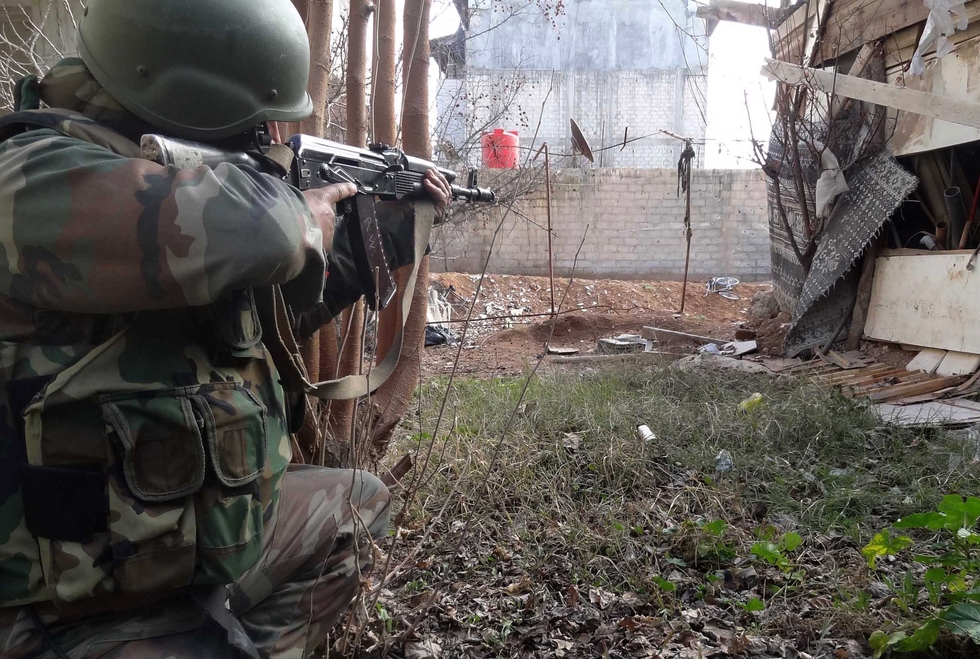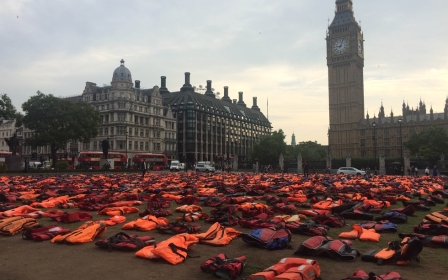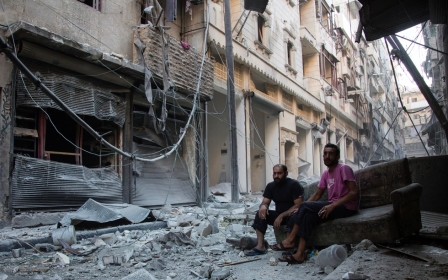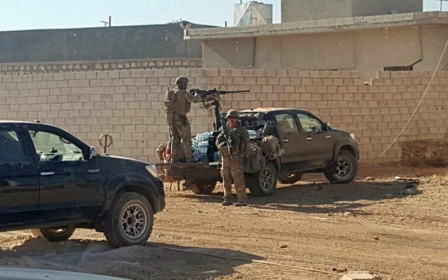Aid convoy attacked in Aleppo as ceasefire fails

A convoy delivering aid to Syrians in Aleppo province was hit by an air strike, leaving 12 dead hours after the Syrian military declared an end to a week-long ceasefire, monitors and the UN said.
At least 18 trucks were destroyed as the convoy travelled to the hard-to-reach town of Orum al-Kubra in Aleppo province, with the Syrian Observatory for Human Rights saying 12 Red Crescent volunteers and drivers had died.
The Observatory was unable to confirm if the planes responsible were Syrian or Russian.
The UN and Syrian Arab Red Crescent humanitarian mission had sought to take advantage of the ceasefire, which collapsed on Monday night as shells and bombs rained down on Aleppo city and the surrounding province.
"The situation on the spot is very chaotic and we are deeply shocked that humanitarian workers and missions have yet again suffered from the brutality of this conflict," ICRC spokeswoman Ingy Sedky told AFP.
Damascus and its ally Moscow blamed rebels for the collapse of the truce, but Washington said the terms had not been met for a key aspect of the deal - US-Russia cooperation against militants.
"The army blocked a huge attack by the Faylaq al-Sham group and is beginning a major military operation on the edges of the capital," a military source told AFP.
The attack on the convoy is likely to provoke anger at the UN General Assembly in New York, with the delivery of aid to desperate Syrian civilians in rebel-held areas stressed as a key condition of the deal by Washington.
The violence comes after almost a week of relative calm, following the introduction of a ceasefire brokered by Washington and Moscow.
The Syrian government has now declared that ceasefire over, adding that "terrorist groups" had used it to rearm while violating it 300 times.
Russia's defence ministry also appeared to bury the truce, saying rebel violations made it "pointless" for government troops to uphold it.
"Considering that the conditions of the ceasefire are not being respected by the rebels, we consider it pointless for the Syrian government forces to respect it unilaterally," said Sergei Rudskoy, a lieutenant general.
The US, Russia and other key players are still set to gather Tuesday in New York for talks aimed at ending the five-year conflict that has killed more than 300,000 people and displaced millions.
The US secretary of state, John Kerry, said US and Russian teams were meeting in Geneva to assess the situation, adding that the ceasefire process was continuing. He went on to stress that the terms for US-Russia cooperation to target certain militant groups in Syria if the ceasefire held had not yet be met.
"The basic ceasefire is holding but fragile," Kerry said in New York City. "We're waiting to get the full download from our team that is meeting now with the Russians."
The already fragile truce was jeopardised by attacks over the weekend, with barrel bomb attacks reported in the besieged city of Aleppo and an errant US coalition air strike that killed more than 60 Syrian troops in Deir Ezzor.
Meanwhile, UN humanitarian aid shipments remained undelivered - a key component of the deal.
Russia and the United States have blamed one another, with relations strained even further after the US-led raid on Saturday, with many Syrian rebel groups also expressing pessimism about the ceasefire.
"I believe that, practically, it has failed and has ended," said Zakaria Malahifji, head of the political office of the Aleppo-based group Fastaqim, adding that it remained to be seen if anything could be done "in theory" to save it.
Asked whether he expected aid to reach rebel-held areas of eastern Aleppo, he said: "There is no hope. It has been a number of days of procrastination. Every day, there is a pretext. There is no hope of aid being delivered currently."
Speaking to Reuters from the Turkish city of Gaziantep, Malahifji also indicated that rebel groups were preparing for new military action. "I imagine in the near future there will be action by the factions," he said.
The opposition's High Negotiations Committee spokesman, Riad Nassan Agha, said the government side had never committed to the truce. "Air raids by Russian and Syrian warplanes, which haven't stopped, suggest the truce never started in the first place," he said.
'Intentional' US-led strike?
President Bashar al-Assad on Monday accused the US of "flagrant aggression" for the attack on its forces in Deir Ezzor.
Speaking to Iran's Deputy Foreign Minister, Hossein Jaberi Ansari, Assad accused world powers of supporting "terrorist organisations" in Syria like the Islamic State group.
"The latest example of this is the flagrant American aggression on one of the Syrian army's positions in Deir Ezzor to the benefit of Daesh," on Saturday, he added, using the Arabic acronym for IS.
Russia said it was "deeply concerned", warning that Washington would have to rein in rebels fighting Assad "otherwise, the realisation of Russia-US agreements... could be put in danger".
"The actions of the pilots - if they, as we hope, were not taken on orders from Washington - fall between criminal negligence and direct pandering to IS terrorists," it said.
An emergency UN Security Council meeting called by Moscow to discuss the attack saw an exchange between the US and Russia reminiscent of Cold War-era verbal jousting.
The situation is likely to loom large at the annual UN General Assembly starting on Tuesday, as well as a UN summit on migration on Monday.
The US ambassador to the UN, Samantha Power, said Moscow's request for Sunday's emergency meeting was a "stunt", while her Russian counterpart, Vitaly Churkin, accused the US of violating agreements that it would not target Syrian army positions.
Churkin called the strike a "bad omen" for the US-Russia deal to halt Syria's civil war, which has killed more than 300,000 people since it erupted in 2011.
Despite the spike in tension, food aid did reach the Damascus suburb of Moadamiyat al-Sham after a government deal granting amnesty to opposition fighters in the besieged town.
Moadamiyat al-Sham mayor, Bassam Karbuj, said about 7,000 food parcels were distributed and that the army would take full control of the town once remaining rebels are bussed out "in the coming days".
Middle East Eye propose une couverture et une analyse indépendantes et incomparables du Moyen-Orient, de l’Afrique du Nord et d’autres régions du monde. Pour en savoir plus sur la reprise de ce contenu et les frais qui s’appliquent, veuillez remplir ce formulaire [en anglais]. Pour en savoir plus sur MEE, cliquez ici [en anglais].




